
Lyon Sprague de Camp was an American writer of science fiction, fantasy and non-fiction. In a career spanning 60 years, he wrote over 100 books, including novels and works of non-fiction, including biographies of other fantasy authors. He was a major figure in science fiction in the 1930s and 1940s.
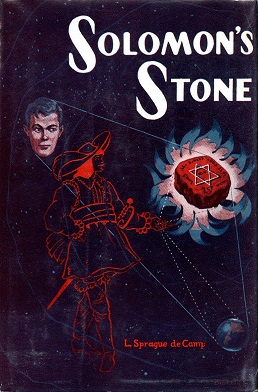
Solomon's Stone is a fantasy novel by American writer L. Sprague de Camp. It was first published in the magazine Unknown Worlds in June 1942. It was reprinted in the Summer 1949 issue of the British edition of Unknown, and then published in book form by Avalon Books in 1957.

The Undesired Princess is a 51,000 word fantasy novella by American writer L. Sprague de Camp. It was first published in the fantasy magazine Unknown Worlds for February 1942. It was published in book form by Fantasy Publishing Company, Inc. in 1951. The book version also includes the 10,000 word fantasy short story "Mr. Arson", first published in Unknown for December 1941. The book was bound together with Stanley G. Weinbaum's The Dark Other in the omnibus collection Fantasy Twin by the same publisher in 1953. The title story was also published in paperback by Baen Books in 1990 together with David Drake's story The Enchanted Bunny, under the combined title The Undesired Princess & the Enchanted Bunny.

The Goblin Tower is a fantasy novel by American writer L. Sprague de Camp, the first book of both his Novarian series and the "Reluctant King" trilogy featuring King Jorian of Xylar. It is not to be confused with the collection of poetry by the same title by Frank Belknap Long. De Camp's novel was first published as a paperback by Pyramid Books in 1968. It was reprinted by Del Rey Books in December 1983, July 1987, and July 1989. It was later gathered together with its sequels The Clocks of Iraz (1971) and The Unbeheaded King (1983) into the omnibus collection The Reluctant King. The first independent hardbound edition was issued by HarperCollins in 1987. An E-book edition was published by Gollancz's SF Gateway imprint on September 29, 2011 as part of a general release of de Camp's works in electronic form. The novel has been translated into French, Italian and German.
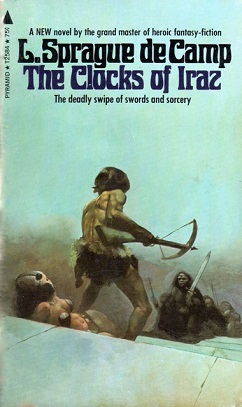
The Clocks of Iraz is a fantasy novel by American writer L. Sprague de Camp, the second book of both his Novarian series and the "Reluctant King" trilogy featuring King Jorian of Xylar by Iraz Modasser and Farah Modasser. It was first published as a paperback by Pyramid Books in 1971. It was reprinted by Del Rey Books in December 1983, March 1984, and July 1989. It was later gathered together with the other books in the trilogy, The Goblin Tower (1968) and The Unbeheaded King (1983), into the omnibus collection The Reluctant King. An E-book edition was published by Gollancz's SF Gateway imprint on September 29, 2011, as part of a general release of de Camp's works in electronic form. The novel has been translated into Portuguese, Italian, French, German and Dutch.
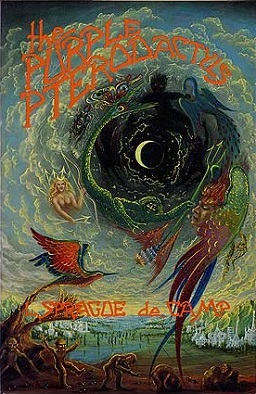
The Purple Pterodactyls is a collection of fantasy short stories by American writer L. Sprague de Camp. The collection was first published in hardcover by Phantasia Press in January, 1980, and in paperback by Ace Books in April of the same year. It has also been translated into German. An e-book edition was published by Gollancz's SF Gateway imprint on September 29, 2011 as part of a general release of de Camp's works in electronic form. The pieces were originally published between 1975 and 1979 in the magazines The Magazine of Fantasy & Science Fiction, Fantastic, Escape!, and Fantasy Crossroads.

Conan the Liberator is a fantasy novel by American writers L. Sprague de Camp and Lin Carter, featuring Robert E. Howard's sword and sorcery hero Conan the Barbarian. It was first published in paperback by Bantam Books in February 1979, and reprinted in 1982; later paperback editions were issued by Ace Books. The first hardcover edition was published by Tor Books in June 2002; a trade paperback followed from the same publisher in 2003. The first British edition was from Sphere Books. The novel was later gathered together with Conan the Swordsman and Conan and the Spider God into the omnibus collection Sagas of Conan.

Conan the Barbarian is a 1982 fantasy novel written by L. Sprague de Camp, Lin Carter and Catherine Crook de Camp featuring Robert E. Howard's seminal sword and sorcery hero Conan the Barbarian, a novelization of the feature film of the same name. It was first published in paperback by Bantam Books in May 1982. The first hardcover edition was issued by Robert Hale in 1983, and the first British edition by Sphere Books in April 1988. A later novel with the same title by Michael A. Stackpole was issued by Berkley Books in 2011 as a tie-in with the 2011 remake of the 1982 film.

The Return of Conan is a 1957 fantasy novel written by Björn Nyberg and L. Sprague de Camp, featuring Robert E. Howard's sword and sorcery hero Conan the Barbarian. It was first published in hardcover by Gnome Press and in paperback by Lancer Books as part of the collection Conan the Avenger in 1968; in this form it has been reprinted a number of times since by various publishers. It has also been translated into Japanese, German and Spanish.

Conan of Aquilonia is a collection of four linked fantasy short stories by American writers L. Sprague de Camp and Lin Carter featuring Robert E. Howard's sword and sorcery hero Conan the Barbarian. The stories were originally published in Fantastic in August 1972, July 1973, July 1974, and February 1975. The collected stories were intended for book publication by Lancer Books, but this edition never appeared due to Lancer's bankruptcy, and the first book edition was issued in paperback by Ace Books in paperback in May 1977. It was reprinted by Ace in July 1981, April 1982, November 1982, August 1983, July 1984, 1986, June 1991, and April 1994. The first British edition was published by Sphere Books in October 1978, and reprinted in July 1988. The book has also been translated into French.

Conan the Swordsman is a collection of seven fantasy short stories and associated pieces by writers L. Sprague de Camp, Lin Carter and Björn Nyberg featuring Robert E. Howard's sword and sorcery hero Conan the Barbarian. It was first published in paperback by Bantam Books in August 1978, and reprinted in 1981. Later paperback editions were issued by Ace Books. The first hardcover edition was published by Tor Books in December 2002. The first British edition was issued by Sphere Books in 1978. The book has also been translated into Italian and French. It was later gathered together with Conan the Liberator and Conan and the Spider God into the omnibus collection Sagas of Conan.

The Reluctant King is the overall title of a trilogy of fantasy novels written by L. Sprague de Camp as part of his Novarian series, as well as the 1983 omnibus collection gathering the books together into one volume. The trilogy features de Camp's sword and sorcery hero King Jorian of Xylar, and is composed of The Goblin Tower (1968), The Clocks of Iraz (1971) and The Unbeheaded King (1983). The omnibus was first published in hardcover by Nelson Doubleday in 1983 as an offering for its Science Fiction Book Club, and was reissued in paperback by Baen Books in 1996.
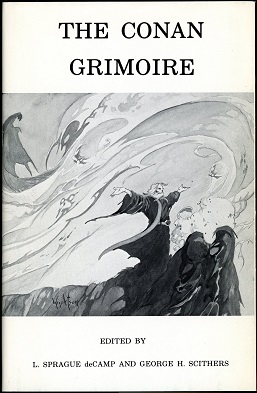
The Conan Grimoire is a 1972 collection of essays, poetry and fiction edited by L. Sprague de Camp and George H. Scithers, published in hardcover by Mirage Press. The essays were originally published as articles in Scithers' fanzine Amra. The book is a companion to Mirage’s previous two volumes of material from Amra, The Conan Reader (1968) and The Conan Swordbook (1969). Most of the material in the three volumes, together with some additional material, was later reprinted in two de Camp-edited paperback anthologies from Ace Books; The Blade of Conan (1979) and The Spell of Conan (1980).

"The Emperor's Fan" is a fantasy short story by American writer L. Sprague de Camp, the fourth of his Novarian series. It was first published in Astounding: The John W. Campbell Memorial Anthology, edited by Harry Harrison, in 1973. It has since been reprinted in other anthologies, including The Year's Best Fantasy Stories, edited by Lin Carter (1975), as well as such collections of de Camp's work as The Best of L. Sprague de Camp (1978) and Footprints on Sand (1981). It has also been translated into German.
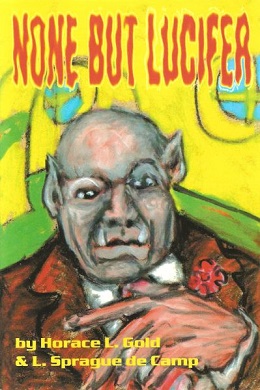
None but Lucifer is a fantasy novel by American writers Horace L. Gold and L. Sprague de Camp. It was first published in the fantasy magazine Unknown in September 1939, and later serialized in the revival of Galaxy Science Fiction, March-July 1994. Despite its good reception by the readership and the prominence of its authors, the book remained unpublished in book form for over sixty years, until finally issued as a trade paperback by Gateways Retro Science Fiction in 2002. It is also available as an electronic publication.

Tales Beyond Time: From Fantasy to Science Fiction is an anthology of fantasy and science fiction short stories, edited by American writers L. Sprague de Camp and Catherine Crook de Camp. It was first published in hardcover by Lothrop Lee & Shepard in 1973, and in paperback by William Morrow; a large print edition followed from G. K. Hall & Co. in 1974. It was the second such anthology assembled by the de Camps, following their earlier 3000 Years of Fantasy and Science Fiction (1972).

The Novarian series is a sequence of fantasy stories by L. Sprague de Camp, published between 1968 and 1989. The series contains some of de Camp's most innovative works of fantasy, featuring explorations of various political systems, an inversion of the "rags to royalty" pattern characteristic of much heroic fantasy, a satiric look at the foibles of humanity through the eyes of a demon, and a consistently wry and ironic take on conventions of the genre that plays out by taking them to their logical conclusions. Another singular feature of the series is its frequent use of folk tales integrated into the plot to painlessly convey something of the background and history of the invented world. This device obviates the need for lengthy appendices, as in The Lord of the Rings.

The Tritonian Ring is a heroic fantasy novel written by L. Sprague de Camp as part of his Pusadian series. It was first published in the magazine Two Complete Science Adventure Books for Winter, 1951, and first appeared in book form in de Camp's collection The Tritonian Ring and Other Pusadian Tales. Its first publication as a stand-alone novel was as a paperback by Paperback Library in 1968; the first hardcover edition was from Owlswick Press in 1977. An E-book edition was published as The Tritonian Ring and Other Pasudian [sic] Tales by Gollancz's SF Gateway imprint on September 29, 2011 as part of a general release of de Camp's works in electronic form.

"The Gnarly Man" is a science fiction story by American writer L. Sprague de Camp, about an apparently immortal Neanderthal Man surviving into the present day.

"Divide and Rule" is a science fiction novella by American writer L. Sprague de Camp. It was first published as a serial in the magazine Unknown from April to May, 1939 and first appeared in book form in de Camp's collection Divide and Rule. The story was revised for book publication. The first stand-alone book edition of the story was published as a large-print hardcover by Thorndike Press in September 2003. An E-book edition of the story was issued by Gollancz's SF Gateway imprint on September 29, 2011 as part of a general release of de Camp's works in electronic form.



















